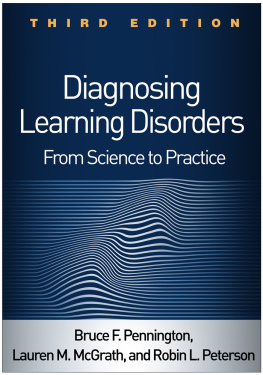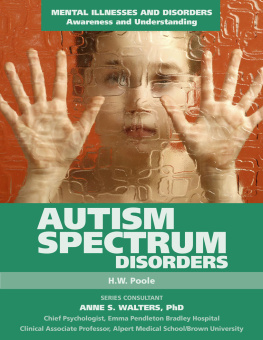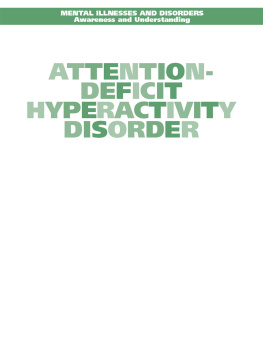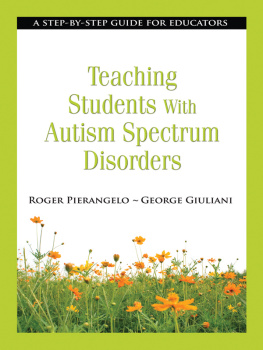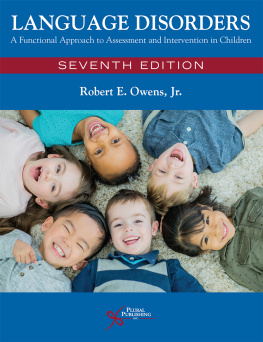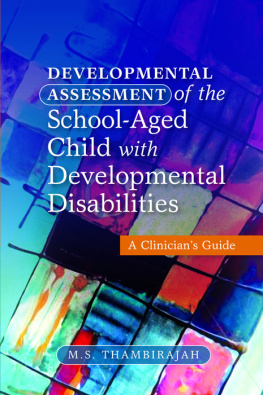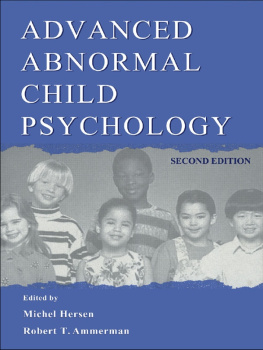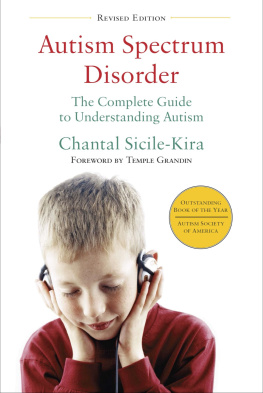Explaining Abnormal Behavior: A Cognitive Neuroscience Perspective
Bruce F. Pennington
Pediatric Neuropsychology, Second Edition: Research, Theory, and Practice
Edited by Keith Owen Yeates, M. Douglas Ris, H. Gerry Taylor, and Bruce F. Pennington
The Development of Psychopathology: Nature and Nurture
Bruce F. Pennington
Diagnosing Learning Disorders
From Science to Practice
THIRD EDITION
Bruce F. Pennington
Lauren M. McGrath
Robin L. Peterson
THE GUILFORD PRESS
New York London
Epub Edition ISBN: 9781462537952; Kindle Edition ISBN: 9781462537938
Copyright 2019 The Guilford Press
A Division of Guilford Publications, Inc.
370 Seventh Avenue, Suite 1200, New York, NY 10001
www.guilford.com
All rights reserved
No part of this book may be reproduced, translated, stored in a retrieval system, or transmitted, in any form or by any means, electronic, mechanical, photocopying, microfilming, recording, or otherwise, without written permission from the publisher.
Last digit is print number: 9 8 7 6 5 4 3 2 1
The authors have checked with sources believed to be reliable in their efforts to provide information that is complete and generally in accord with the standards of practice that are accepted at the time of publication. However, in view of the possibility of human error or changes in behavioral, mental health, or medical sciences, neither the authors, nor the editors and publisher, nor any other party who has been involved in the preparation or publication of this work warrants that the information contained herein is in every respect accurate or complete, and they are not responsible for any errors or omissions or the results obtained from the use of such information. Readers are encouraged to confirm the information contained in this book with other sources.
Library of Congress Cataloging-in-Publication Data
Names: Pennington, Bruce Franklin, 1946 author.
Title: Diagnosing learning disorders : from science to practice / Bruce F. Pennington, Lauren M. McGrath, Robin L. Peterson.
Description: Third edition. | New York : The Guilford Press, [2019] | Includes bibliographical references and index.
Identifiers: LCCN 2018052173 | ISBN 9781462537914 (hardback)
Subjects: LCSH: Learning disabilitiesDiagnosis. | Autism in childrenDiagnosis. | Attention-deficit hyperactivity disorderDiagnosis. | BISAC: PSYCHOLOGY / Neuropsychology. | MEDICAL / Psychiatry / Child & Adolescent. | EDUCATION / Special Education / Learning Disabilities. | PSYCHOLOGY / Psychotherapy / Child & Adolescent.
Classification: LCC RJ496.L4 P46 2019 | DDC 618.92/85889dc23
LC record available at https://lccn.loc.gov/2018052173
For Linda, Amy, Luke, Della, and Dorothy
B. F. P.
For my parents, Todd and Mary Ann.
Their educational values and strong work ethic continue to inspire my career.
L. M. M.
In loving memory of my father, Bob Leonhardt.
His commitment to knowledge, education, and the dignity of all people provided a model that continues to guide me.
R. L. P.
Bruce F. Pennington, PhD, is Distinguished University Professor Emeritus in the Department of Psychology at the University of Denver. He has conducted extensive research on learning disorders and their comorbidity, using genetic and neuropsychological methods. Dr. Pennington is a recipient of Research Scientist, MERIT, and Fogarty awards from the National Institutes of Health; the Samuel T. Orton Award from the International Dyslexia Association; and the Emanuel Miller Memorial Lecture from the British Association for Child and Adolescent Mental Health.
Lauren M. McGrath, PhD, is Assistant Professor in the Department of Psychology at the University of Denver. Her expertise is in child clinical psychology, developmental neuropsychology, and psychiatric and behavioral genetics. Dr. McGraths research focuses on children with learning disabilities along two main themes: comorbidity between learning and behavioral disorders, and genetic risk factors and geneenvironment interactions.
Robin L. Peterson, PhD, ABPP, is a pediatric neuropsychologist and Assistant Clinical Professor at Childrens Hospital Colorado/University of Colorado School of Medicine. She has clinical and research interests in learning disorders, pediatric traumatic brain injury (including concussion), and spina bifida. Dr. Peterson is board certified in clinical neuropsychology. She lives in Denver with her husband, Eric, and daughters, Cordelia and Beatrix.
Laura M. McGrath and Robin L. Peterson made equal contributions to this book. The order of their authorship was determined alphabetically.
T his book is about the science and practice of learning disorders, which are prevalent and impairing conditions that for too long were neglected by mainstream psychology and medicine. For much of the 20th century, learning disorders were relegated to the margins of science, characterized by various myths, and treated with controversial alternative therapies.
Some of these myths are still prevalent today, such as the myth that dyslexia is a visual disorder that causes a person to see things backward. Or there is the myth that vaccines cause autism (this myth has even reached the White House!). Not too long ago, it was even popular to claim that some learning disorders themselves were myths. For instance, it was argued that attention-deficit/hyperactivity disorder (ADHD) did not exist as a disorder, that it was just a medicalization of normal childhood exuberance. Or when one of us (BFP) first entered the field, it was seriously proposed that learning disabilities did not exist, that instead they were a middle-class myth to protect the self-esteem of parents whose children were not meeting high educational expectations. Or if they agreed that learning disabilities did exist, clinical psychologists proposed Freudian explanations of learning disabilities based on unconscious conflicts. For instance, they hypothesized that mathematical problems with addition were caused by oral issues, problems with subtraction were caused by castration anxiety, problems with multiplication were caused by sexual conflicts, and so on. It is our hope that all readers of this book agree that learning disorders do exist and can see how ludicrous these Freudian explanations of math problems are, but it may take a little more understanding of science to understand why the other myths are wrong.
The fact that we have been able to refute all these myths about learning disorders demonstrates how science works. Various hypotheses about how and why things happen in the world can be rigorously examined to determine whether they are true, and science progresses by rejecting wrong ideas about how the world works. The dustbin of scientific history is filled with curious ideas such as the earth is flat, the sun revolves around the earth, the stars are mounted on crystalline spheres (hence, the music of the spheres that some of us sang about in church), the mind is in the heart, invisible ether is needed to transmit light, and combustion occurs when objects give up their phlogiston. It is our hope that all readers of this book recognize that these ideas are wrong, and can even explain why most of them are wrong.
The ultimate goal of scientific research on learning disorders, like all biomedical research, is to improve public health by improving early detection, intervention, and ultimately prevention. This is a virtuous cycle between science and practice: Practice leads to scientific questions, and scientific research improves practice, which in turn leads to new scientific questions. This book illustrates this virtuous cycle in the domain of learning disorders.
Next page
